Book review: "Consider the Turkey" by Peter Singer
An OG of the animal rights movement schools us on a barbaric industry
Americans commercially produce about 210 million turkeys per year. I always have a hard time imagining large numbers, so here are some examples to put 210 million turkeys into perspective.
If you stacked all those turkeys on top of each other, they’d reach halfway to the moon.
If all the turkeys stood side-by-side with wings outstretched, they’d circle the earth over 6 times.
The weight of all the turkeys combined would be 55 Titanics or 7 Golden Gate Bridges.
Their total neurons are somewhere between 100-400x all the stars in the Milky Way.
Point is, we kill a lot of turkeys, 99 percent of whom come from factory farms and live horrible lives. This Thanksgiving, Peter Singer wants you to think harder about whether that’s something you are okay with. He wants you to challenge yourself, and those around you, to be kinder. He even gives some helpful talking points for exploring the ethics of eating turkeys during your next holiday get-together:
Just ask the family and friends gathered together if they know how the bird they are eating was conceived. If they don’t, enlighten them. Then ask them whether ensuring that everyone can get a generous slice of turkey breast is worth breeding a misshapen bird who cannot mate, requiring poorly paid workers to spend all day masturbating male turkeys and pushing open the vaginas of female turkeys, who hate the procedure, but who have no escape from it until they are sent off to be killed.
I think he’s joking, but he simply ends a chapter with that paragraph and then moves on. Honestly, good for him. He’s been at this animal rights thing too long to worry about whether learning about turkey sex at Thanksgiving makes anyone uncomfortable. In fact, the entire point of his latest book, Consider the Turkey, is to make turkey eaters as uncomfortable as possible. He wants people to understand that something very cruel and unnatural is going on with how we raise turkeys for food. At that, he very much succeeds.
A brief overview of how turkeys live and die
Singer does about what you’d expect, given the title. He begins with how turkeys are smart animals with sophisticated social hierarchies, then discusses all the awful things we do to them on factory farms, and finally points out how the whole system is an ethical disaster. A few vegan recipes are thrown in at the end, which I could have done without, but hey, why not. It all goes quick, as the hardcover version of the book is a mere 104 really tiny pages.
I expected the book to be packed with examples and studies showing how turkeys are stocky little geniuses. After learning all about chicken cognition for a recent article, I I was excited to learn about similarly stunning intellectual capabilities in turkeys.
Unfortunately, when Singer reached out to a researcher to learn more about turkeys, he was told that, “There literally exists no literature on turkey cognition.” Well then! That said, the researcher went on to point out that it’s reasonable to assume turkeys are as smart as chickens because turkey social behavior is just as complex.
In lieu of studies, we learn a bit about the life of a rescued turkey named Cornelius, who lives at a farm sanctuary. Pulling extensively from this blog post, Singer talks about how Cornelius is sensitive, intelligent, outgoing, friendly, and clever.
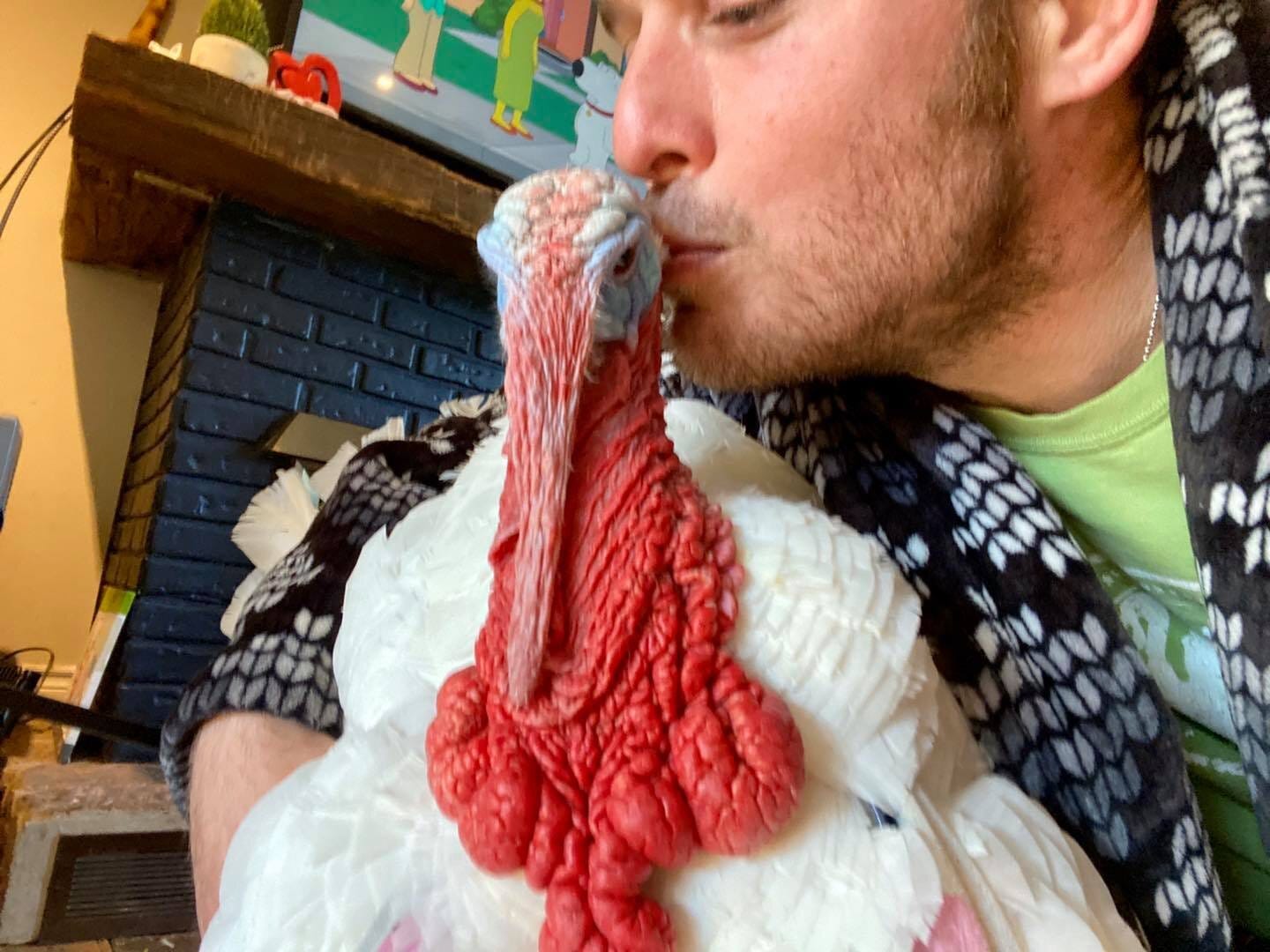
I enjoyed this section. I think it helps ground people to focus on individual animals. It can feel difficult to care about turkeys in the abstract, but who could not care about Cornelius? Singer hopes we’ll remember this specific bird, age 7 at the time of writing, as we learn about the horrible ways Cornelius’s brethren are treated.
And yeah, it really does get horrible. He gets into every gruesome detail of their forced breeding. They have to be impregnated manually because the type of turkey used on factory farms is so humongous and distorted they can no longer mate on their own. Singer makes the good and under-discussed point that, “In most jurisdictions, sexually assaulting an animal is a crime. How does what [the undercover investigator] depicts differ from a sexual assault on the hen?”
Not only can turkeys not breed, many of them can barely even stand up, given their unnaturally massive bodies. Broken legs are common, as are arthritis and foot pad dermatitis.
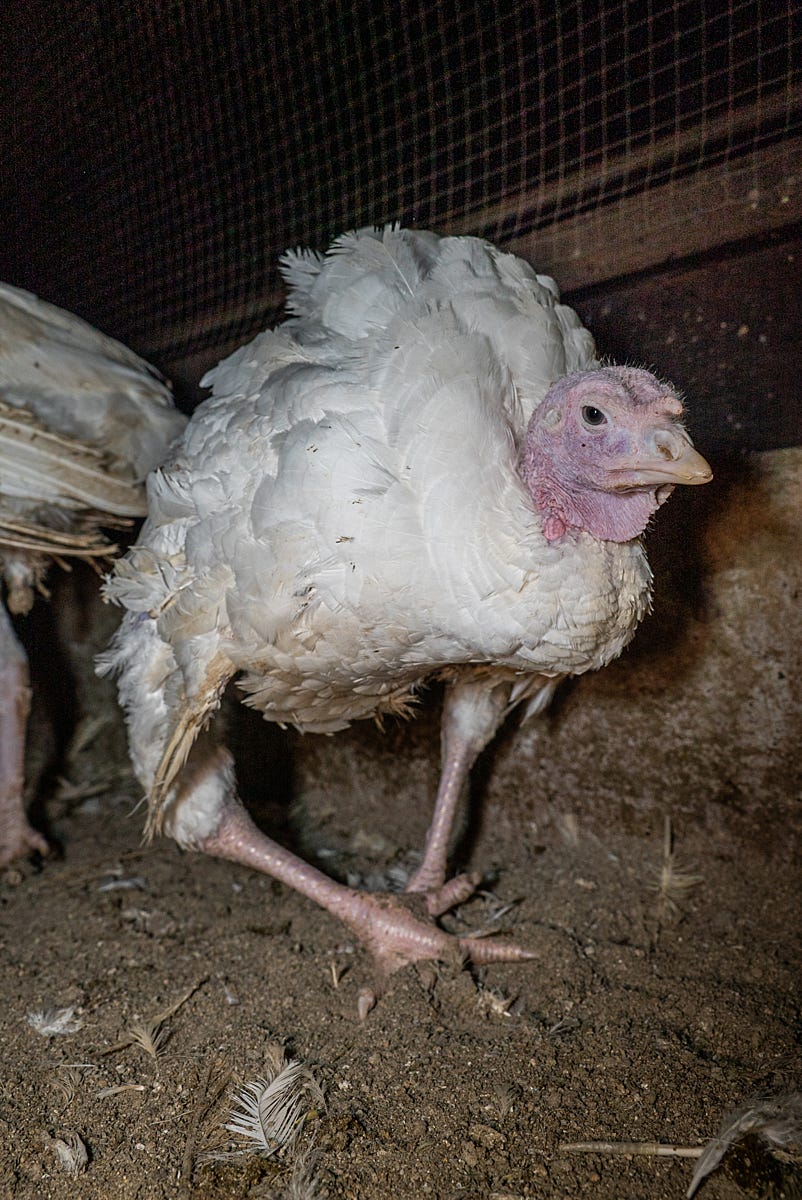
Another problem is “breast buttons,” the term for a burn turkeys get from lying down on their chests all day, seeking relief from the pain of standing. 30% of farmed turkeys have breast buttons.
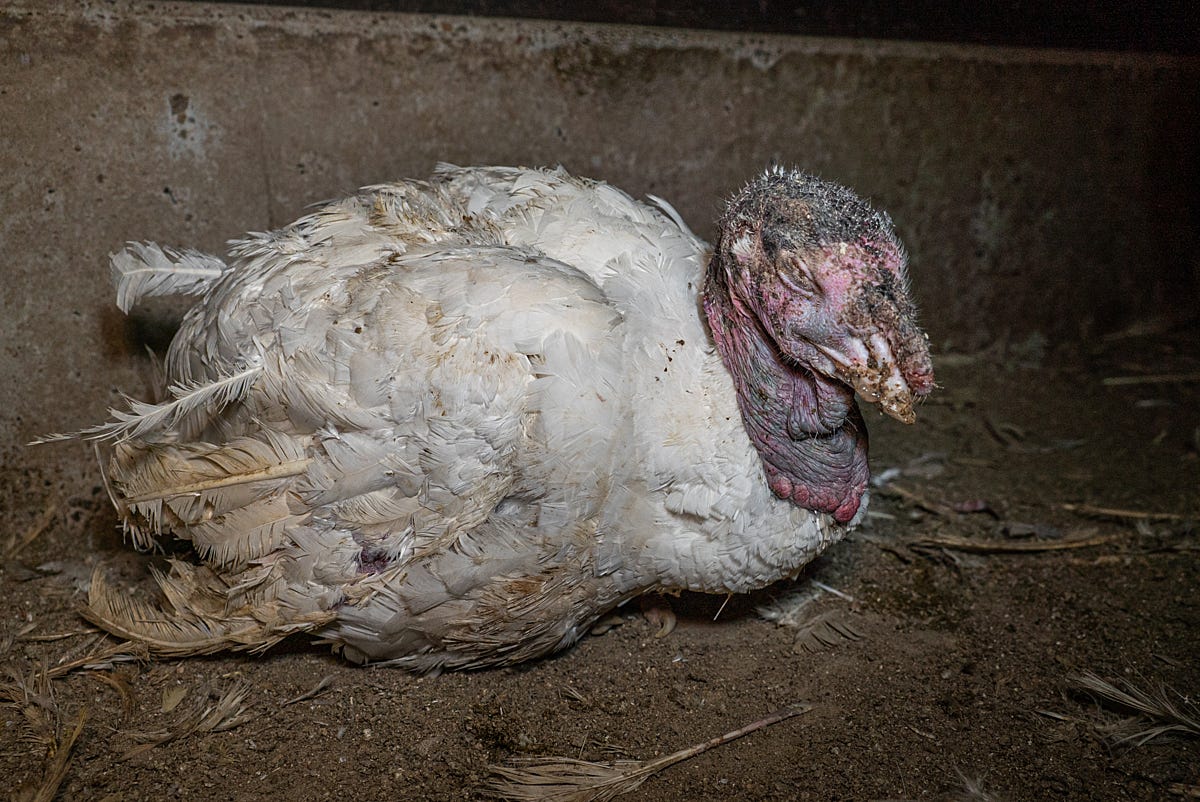
Then there’s of course the routine mutilations, like debeaking and claw removal. I’ve read so much about this kind of stuff in chickens that I kind of glossed over this section. It’s par for the course, as awful as it is. What snapped me back to attention was reading about how, at 5 weeks of age, the birds have to get used to the “poultry trainer.” That’s when a 120 volt current is sent through all the cables in the barn that a turkey might try to perch on. Perching is, of course, a natural turkey behavior. So what ensues is a bunch of baby birds trying to perch on wires and then getting painful shocks. According to an undercover investigator referenced by Singer, quite a few birds become tangled in wires and are electrocuted to death.
I used to live in a place where wild turkeys would wander through my yard every so often. It never got old. I’d run to the window and gawk at them whenever they came by. The best was when there was a couple adults and a bunch of juveniles. It was such a joy to watch the whole family strutting around together, hanging out, pecking at the grass. Baby turkeys are adorable.
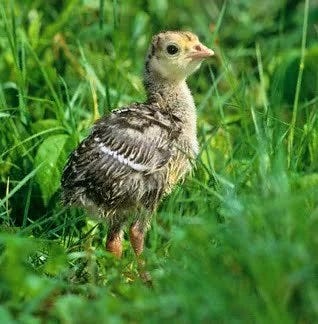
All that to say, it’s quite sad to imagine all those baby birds getting electrocuted as they tried to find some tiny bit of solace in an ammonia-filled, windowless shed.
After telling us a bit about the appalling way in which factory farmed turkeys live, we get all the gory details of slaughter. As you might expect, in places that can kill 50,000 birds per day, animal welfare is not the highest of concerns. It’s also of note that the birds are killed at 3-4 months of age, when a turkey can easily live to ten years old.
Singer spends a good amount of space railing against a specific technique used to kill huge amounts of birds at once. The industry, in a bit of Orwellian parlance, calls these mass killing events “depopulating” a farm. The method preferred for depopulation by American turkey farmers is called Ventilation Shutdown Plus Heat (VSD+). It’s used after there’s any kind of infectious disease found at a barn.
I understand why Singer is so worked up about VSD+. The method is barbarism at its finest. Barns are sealed off, heaters are turned on, and they wait for the birds to die of heatstroke. This takes about 3 hours, and even then not all the birds die.
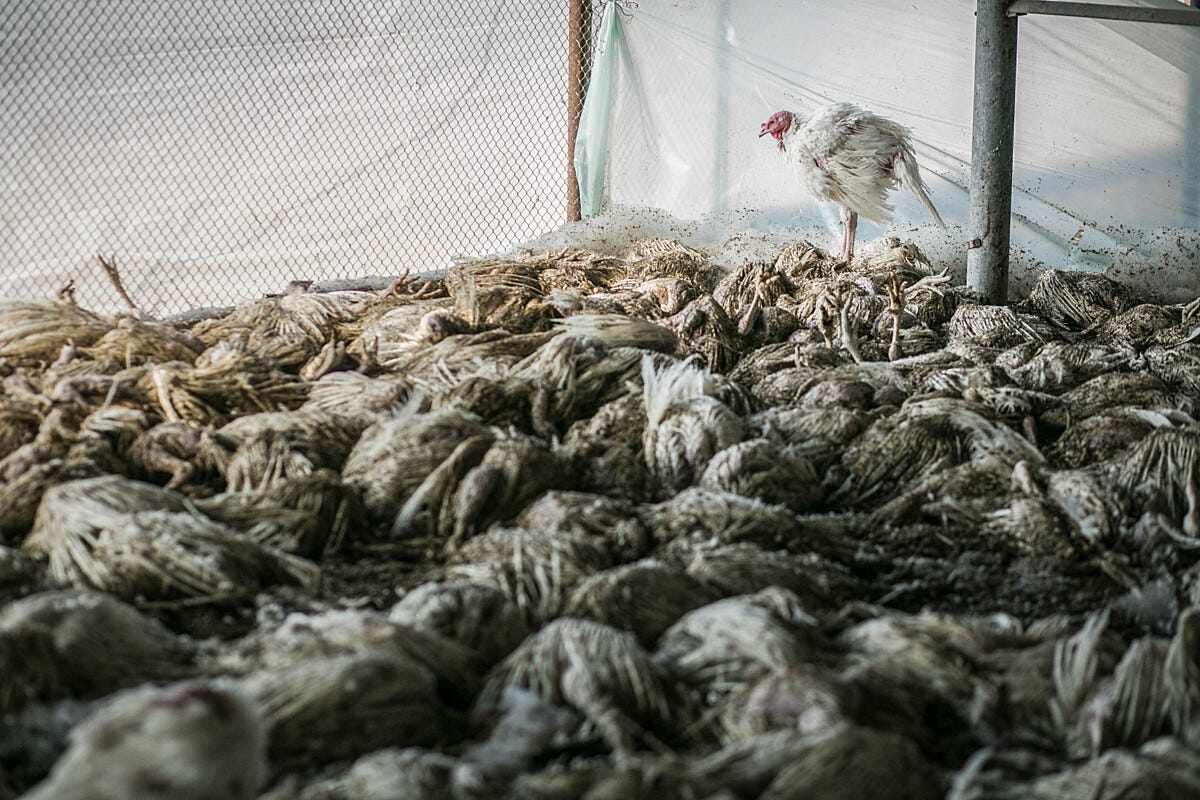
More humane ways of killing off a barn, such as with nitrogen gas, do exist. It’s the preferred way to go in Europe. Some American veterinarians are up in arms about the cruel way things are handled in this country, but the vets employed by Big Ag say this is all very above board and humane.
It doesn’t help matters that the US Government will only reimburse farmers for birds they have to depopulate if the farms use VSD+ to do the killing. Jennie-O, the largest turkey producer, received 106 million dollars in compensation between 2022 and April 2024 due to depopulation events. Singer gets to the heart of how messed up that is:
Effectively, the federal government is providing free insurance to US agribusiness corporations against the financial risk involved in intensively producing chickens and turkeys in an era of HPAI. [bird flu] If you are a US taxpayer, that’s your taxes going to yet another subsidy for businesses that provide poor conditions for their workers, are wasteful of food and disastrous for the environment, and inflict a vast universe of suffering on animals.
He wraps up his arguments with a tight chapter on ethics. There are no surprises here. He is a utilitarian who wants to reduce the most suffering for the most beings, though he’s adamant that you don’t have to be a utilitarian to think turkey farming as practiced should be shunned. Mostly, he implores us not to treat certain animals differently just because we’ve traditionally eaten them. He believes that if you wouldn’t eat dogs you should stop eating turkeys. That’s an argument that the folks at Elwood’s Organic Dog Meat will surely take offense to.
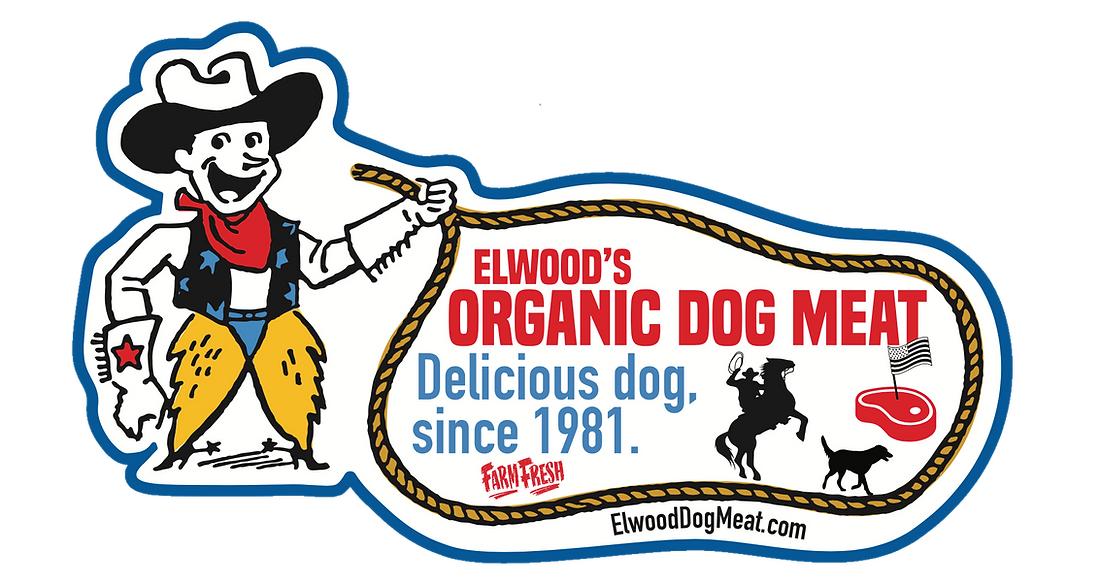
I think it’s a wonderful little book, but there are a couple areas I felt could have been improved. The part about turkey intelligence and personality lack some oomph. It’s tough when there are no scientific studies he can point to, I’ll give him that. But I’m not sure it was the best choice to rely so heavily on a single blog post about one turkey to make his points about the cognitive capabilities of these birds. I loved learning about Cornelius the turkey, but I wish Singer could have gone to a sanctuary and interacted with some other turkeys first hand, or tried to find a few more people raising turkeys as pets. That could have given us a more well-rounded look at their intellects and made that section a bit more convincing to a skeptic.
I also wanted to know more about his thoughts regarding how non-turkey eaters should interact with turkey eaters. At the end of the book, he seems to endorse the “liberation pledge,” where people promise to not eat at tables where animals are served.
Comparing turkeys to dogs, he says that if you would “never, ever sit around a table at which the carcass of one of these dogs was carved up and eaten, then you should not act any differently with regard to the existing US turkey industry.” He drops that pretty heavy expectation on people and moves on without offering up any practical advice or saying whether he consistently lives up to that standard. Hearing from Singer on this topic would have been more interesting than reading his recipe for vegan mushroom make-ahead gravy.
There’s nothing new, but it’s still compelling
Sure, I can find information online about the problems associated with raising turkeys in our commercial food system. But this is Peter Singer saying it, which makes it all carry a little more weight. I also think there is value in collecting information into an easy-to-read, well-crafted book. He is a good, clear, compelling writer, and I’d be in favor of him writing tons more in this short-form style. Let’s start a grassroots campaign for Consider the Insects. I can’t be the only one who wants to know Singer’s extensive thoughts on cricket farming.
Overall, I’m just so impressed that Singer is still going strong after all these years, and that he remains optimistic. In an interview with the New York Times about Consider the Turkey, he’s asked about whether he despairs at the lack of progress in the animal rights movement. Is he just banging his head against the wall? His answer is inspiring.
No. I feel like I’m banging my head against something which is pretty hard but not completely unyielding. In some parts of the world, we’ve made progress in the laws and regulations concerning animals. On the whole, yes, things are still bad, but it’s possible to make progress, and we have to keep bringing these facts in front of the public and getting them to think about what they’re eating. The Thanksgiving meal seems like a good place to start.
Amen to that.




